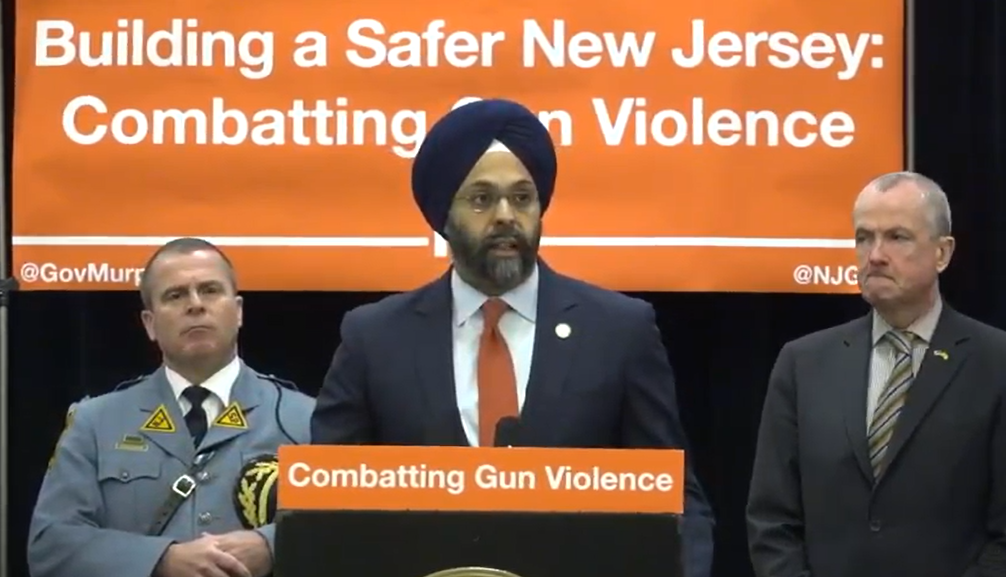N.J. Sues to Block Trump Administration from Reducing Penalties for Car Companies that Violate Vehicle Emissions Standards

N.J. Sues to Block Trump Administration from Reducing Penalties
for Car Companies that Violate Vehicle Emissions Standards
Coalition of AGs Files Petition for Review Challenging Rollback of Penalty
By 60% to Nearly the Same Level as in the 1970s
TRENTON – Attorney General Gurbir S. Grewal today joined a coalition of Attorneys General in suing the National Highway Traffic Safety Administration (NHTSA) to stop it from weakening air quality enforcement efforts by slashing the penalty for auto makers that violate national fuel economy standards.
The federal Corporate Average Fuel Economy (CAFE) standard regulates how far a fleet of vehicles must be able to travel on a gallon of fuel—in other words, their overall fuel efficiency. Although CAFE standards are the linchpin of the federal government’s efforts to reduce vehicle contributions to climate change, the Trump Administration last week finalized a rule to reduce the penalty from $14 per tenth-of-a-mile-per-gallon to $5.50, a 60% reduction. That brings the penalty down to almost the same level that it was in 1975—when Congress first established the penalty at $5.
Today, New Jersey joined with California, New York and other states in petitioning the U.S. Court of Appeals for the Second Circuit to set aside NHTSA’s new, reduced penalty, and reinstate the $14 penalty adopted under the Obama Administration.
“Fuel efficiency standards are the heart of our country’s efforts to improve our air and protect us from the threat of climate change,” said Attorney General Grewal. “But our environmental laws are only as strong as the penalties they bring. We should be doing more, not less, to combat climate change, which is why I’m proud to file this lawsuit challenging the Administration’s decision to slash the penalties for these environmental offenses. The auto industry needs to know that a penalty for breaking our laws is more than just the cost of doing business.”
“The federal government is putting the brakes on progress toward cleaner air. Effective enforcement of federal fuel emission standards is a critical component of New Jersey’s work toward responding to climate change,” said New Jersey Department of Environmental Protection Commissioner Catherine R. McCabe. “At a time when we are seeing increased adoption of electric vehicles and clean energy, this is a detour in the wrong direction.”
In response to the energy crisis of the 1970s, Congress in 1975 enacted theEnergy Policy and Conservation Act (EPCA), a comprehensive energy law that also sought to reduce the country’s fuel consumption. EPCA created fleet wide vehicle emissions standards and imposed a civil monetary penalty for violations of those standards. EPCA set the penalty at $5 per tenth-of-a-mile-per-gallon, which was increased to $5.50 in 1997.
Congress adopted the Inflation Adjustment Act in 2015, which recognized that a penalty does not carry the same weight over time and thus required agencies to update civil penalties in light of inflation. In 2016, NHTSA increased the CAFE civil penalty to $14 and, as part of its action, conducted an analysis of the action’s economic impact. That analysis found the increased penalty would not harm the U.S. economy.
The Trump Administration, however, delayed renewal of the $14 penalty amount and temporarily applied the old $5.50 penalty while the $14 penalty was “re-evaluated,” which effectively suspended the higher $14 penalty. A multi-state coalition responded by challenging the action, however, and a federal appeals court vacated the suspension and reinstated the $14 penalty.
In response, NHTSA is now using the federal rulemaking process to roll back the $14 penalty and return that penalty to the $5.50 rate. The final rule fixing the penalty at $5.50 was published in the Federal Register on July 26.
Today’s federal court action comes on the heels of multistate comments opposing this rulemaking at the proposal stage. As that time, the multistate coalition asserted that the $14 CAFE penalty was an important tool for combating climate change, and called the plan to shrink the dollar amount to 1997 rates unreasonable and unlawful.
The states’ comment letter noted that federal law requires NHTSA to maintain the $14 penalty in light of inflation. The letter also took issue with the federal government’s arguments that a higher penalty would harm the U.S. economy, which lacked any sufficient basis in fact.
Participation in today’s lawsuit is the latest action by Attorney General Grewal and DEP to safeguard New Jersey’s environment and combat climate change. Among other things, Attorney General Grewal:
- Filed an ongoing lawsuit challenging EPA’s decision to loosen the very same fuel efficiency standards at issue here. Also filed comments opposing EPA’s plan.
- Along with NJDEP and NJBPU, filed comments opposing EPA’s lax regulations on greenhouse gas emissions from power plants. Attorney General Grewal also withdrew from West Virginia v. EPA, in which the Christie Administration sought to block the Clean Power Plan that addressed such emissions.
- Challenged the Department of the Interior’s decision to let companies engage in seismic testing in the Atlantic despite harm to marine mammals, the first step towards offshore drilling – and got DOI to table its offshore drilling plans.
- Sued EPA over its decision to suspend a rule limiting the production of super-polluting trucks known as “gliders” – another suit that led EPA to back down.









